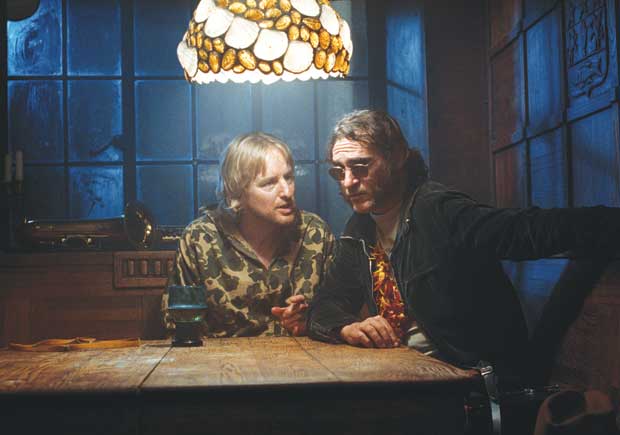
PULP FICTION | Owen Wilson, left, makes a clever cameo, but Joaquin Phoenix carries ‘Inherent Vice.’
Which of the new crop of films are worth seeing? Most of them: ‘Inherent Vice,’ ‘Selma,’ ‘Mr. Turner’
Inherent Vice
Paul Thomas Anderson is one of those newish breed of filmmakers (along with David O. Russell, J.C. Chandor, Bennett Miller and Jason Reitman) who strikes me as self-consciously trying to be un artiste. (Gus Van Sant, on the other hand, doesn’t need to try; he just is.) His films feel calculated and bizarrely inorganic, even when they are good. But it’s been since 1997’s Boogie Nights — his second feature — that he’s actually been entertaining … until now.
Inherent Vice, Anderson’s seventh film, is the first-ever film adaption of a work by reclusive, quirky novelist Thomas Pynchon, himself a legit literary artist. Pynchon’s rangy, pun-filled prose lives in its verbiage, so finding a visual cognate is no small feat, but Anderson has done just that, striking a whimsical but mysterious tone that drives the roving plot.
Anderson isn’t known for his comedy chops (his last attempt, Punch Drunk Love, was Adam Sandler’s least funny film, and that says something), but he and Pynchon seem to be in synch will this period piece. Set in the early 1970s during the waning days of hippie drug culture, it revolves around pothead private detective Doc Sportello (Joaquin Phoenix, as strange as ever but more accessible) and his quest to track down a former lover. It’s a formulaic plot as old as Dashiell Hammett (and as recent as The Big Lebowski).
The film runs a meandering two-and-a-half hours, with tons of cameos and off-type performances from Martin Short to Owen Wilson to Reese Witherspoon. The key to enjoying it all? Don’t get caught up in the plot, but in the characters and the pacing and droll satire. This is a thinking person’s comedy, a lampoon aimed at adults, not teens. Revel in it while you can. (Now playing at Angelika Mockingbird Station.)
Selma
Martin Luther King Jr. is as close as America has ever come to a genuine secular martyr and voice of conscience, a Nobel Peace Prize winner struck down at 39 but whose legacy is almost unfathomable. His influence on the Zeitgeist echoes as strongly today as it did 50 years ago, when he led a march on Selma, Ala., to protest the denial of voting rights to black Americans. The racist reaction so shocked the sense of those who saw it that even non-activists whites joined his cause.
Selma magnificently captures the humanity and political savvy of King (an Oscar-worthy David Oyelowo) while reminding us that as many strides as we have made, there’s still a long way to go. (Look for a film called Ferguson a decade from now.) Ava DuVernay makes an auspicious feature directing debut, gracefully underplaying the scenes of violence with such restraint (no mawkish underscore or slo-mo blood-letting) that the courage of the people who stood firm against the state quakes you. Selma is not just a history lesson; it’s a monumental reminder of the majesty of the human spirit. (Now playing at Angelika Mockingbird Station.)
Mr. Turner
British director Mike Leigh specializes in improv-style films about contemporary themes… except when he wanders into tightly-constructed 19th century biopics like Topsy-Turvy and, now, Mr. Turner. The man in question is landscapist J.M.W. Turner (Timothy Spall), often considered Britain’s greatest artist, who pre-figured the post-impressionists with his blurred visions of seascapes and countrysides. He was a modernist before it was acceptable, and a curmudgeonly old sod at that.
Spall digs deeps into Turner’s interior life, and Leigh makes the solidary act of painting feel cinematic, although the pacing drags and the denouement falls sudden and stiffly, as if, unlike Turner’s famed locomotive, the film simply runs out of steam. (Now playing at Landmark’s Magnolia.)
— Arnold Wayne Jones
This article appeared in the Dallas Voice print edition January 9, 2015.


